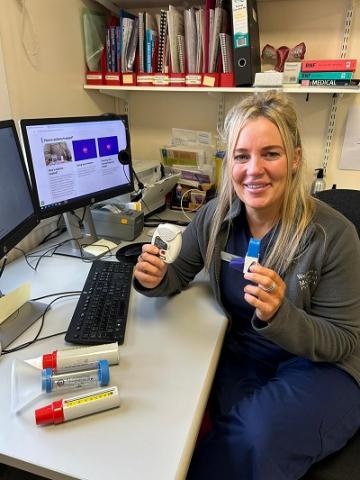
Primary care teams in Dundee have been helping patients who live with respiratory diseases switch to more environmentally sustainability inhalers, saving the equivalent of 590,000 smartphone charges and 27 return flights from London to New York.
Nurses at Westgate Medical Practice and GPs and asthma nurses at Douglas Medical Centre have successfully helped a large number of patients move from using meter dosed inhalers (MDIs) to more sustainable dry powder inhalers (DPIs).
Certain inhalers are less environmentally friendly with MDIs containing a powerful greenhouse gas propellant which contributes to global warming. DPIs do not contain any greenhouse gases and therefore have a significantly lower carbon footprint.
The nurses at Westgate have been carrying out educational discussions with patients at their respiratory nurse reviews, which has led to the switch. This project alone has saved almost nine tonnes of CO2 over the last year, equivalent to driving 63,817km or charging your smartphone 589,397 times. It has also saved NHS Tayside an estimated £3457.
At Douglas Medical Centre, the team has also been working with asthma and COPD patients at their reviews to identify inhalers best suited to them. Over a one-year period, the carbon footprint savings of the inhaler work carried out at the practice totalled 53.2 tonnes of carbon dioxide – the equivalent of 27 return flights from London to New York.
Patients have said they were really happy to make the switch to more environmentally friendly inhalers as they are more discreet, don’t require a spacer device, and it is an added bonus that it helps the environment.
NHS Tayside clinical teaching fellow Dr Samuel Donnelly, who has been supervising the project at Westgate Medical Practice, said, “This was a brilliant opportunity for students and staff to collaborate together on a piece of meaningful work that will continue to help patients, the NHS and the planet. As an asthmatic myself, I have recently switched to a dry powder inhaler and I have found that it is much easier to achieve good inhaler technique with this device.”
Dr Ciara Drummond, a GP at Douglas Medical Centre who supports sustainable inhaler prescribing across Tayside, agrees that the work is very important. She said, “There are many ways that we can provide sustainable and safe asthma care. It’s great to see that small, sustainable changes across the practice team are having such a big impact on our carbon footprint.
“We have all learnt a lot about the climate impact of the healthcare we’re providing and our patients have too. The work with inhalers has inspired us to look at more areas where we can provide good clinical care which doesn’t cost the earth.”
The NHS is responsible for 5% of the UK’s carbon emissions, with MDIs and anaesthetic gases contributing to 4% of the NHS’s total carbon emissions.
NHS Tayside has also decommissioned all Nitrous Oxide (N2O) cylinders and shut down the pipelines to prevent gas wastage in Stracathro Hospital, Perth Royal Infirmary, Ninewells Hospital.
https://www.nhstayside.scot.nhs.uk/News/Article/index.htm?article=PROD_…